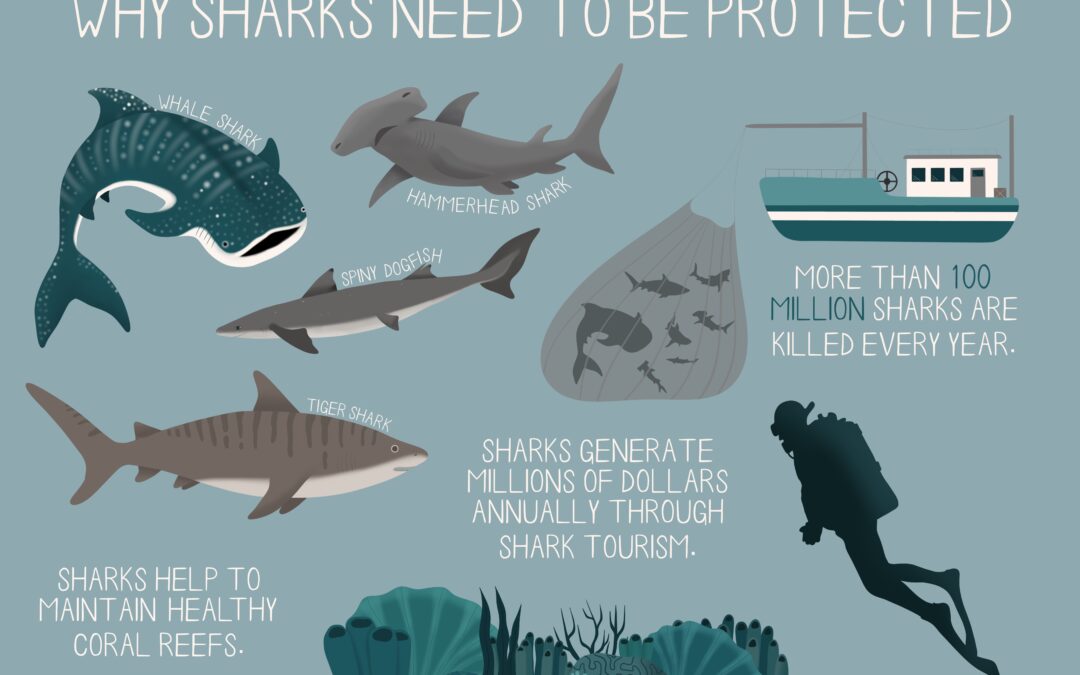By Alexandra Hill (BSc Marine Biology and Coastal Ecology)
Just mention the word “shark” to most people and their mind probably jumps to images of ruthless killing machines. That, or they hear the chilling notes of the Jaws theme tune (thanks, Steven Spielberg). It’s no secret that many shark species are top predators, so wondering “why do sharks need to be protected?” isn’t a silly question.
Hollywood cinema and the media have sensationalized shark attacks. But, in reality, the chances of dying by shark bite are around 1 in 3.7 million (those aren’t bad odds, right?). Actually, it’s sharks that should be fearing humans, not the other way around! Globally, shark populations are declining, and overexploitation by humans is why.
If you’re not totally sold on why sharks need to be protected, here are 5 reasons why:
1: They’re Apex Predators
Yes, even predators (like sharks) at the top of the food chain need to be protected. Sharks are important for maintaining healthy levels of species lower down in the food chain.
Sharks tend to target sick or weak animals as their prey. By doing so, they help to limit the spread of disease in prey populations. They also strengthen the gene pool of their prey by preventing weak individuals from reproducing. Harsh, but helpful.
What’s more, sharks help to keep the balance between other predators and their prey. They hunt a range of prey, preventing a single species’ population from growing so large they monopolize resources. By doing this, sharks help to maintain species diversity (an important part of a healthy ecosystem).
The presence of sharks has a positive impact on seagrass meadows. Sharks prey on turtles, dugongs, and other grazers that feed on seagrass meadows. Without sharks, high populations of grazers could overexploit the beds, causing extreme habitat loss. Sharks keep their populations in check, plus there’s evidence they influence grazer behavior, in a way that helps to protect the seagrass.
2: They Help Maintain The Reef
In a similar way to how sharks help maintain seagrass beds, they are also very important in maintaining a healthy coral reef! *does celebration dance*
Without sharks, large predatory fish populations like groupers would increase, causing grazing fish numbers (like parrotfish) to decline. Grazing fish are herbivores that mainly feed on reef algae. Without them, the algae would grow out of control, smothering and possibly killing the corals on the reef. This is definitely a top reason why sharks need to be protected.
3: Climate Change
Hold on a second… sharks need to be protected because of climate change??? Yes. Yes, they do. As mentioned earlier, more sharks = more seagrass (in a nutshell).
Seagrass is actually a carbon sink and absorbs carbon up to 35 times faster than the rainforest! It also absorbs 10% of the ocean’s carbon every year. By protecting sharks, we’re protecting seagrass and storing carbon. It’s a win-win.
Sharks are also effective carbon sinks themselves. A shark can contain between 10 and 15% of carbon in its tissues. When pelagic sharks die, they sink (a very long way) to the bottom of the sea, keeping all their carbon with them, potentially for thousands of years.
When sharks are caught, the carbon inside them is partially released into the atmosphere as CO2 for days to weeks after.
4: They Contribute To The Economy
To contradict Bon Jovi, sharks are NOT wanted dead or alive! Sharks are worth a hell of a lot more alive. If the above reasons didn’t convince you why sharks need to be protected… maybe cold, hard cash will.
A 2010 study by Australian scientists in Palau, where the shark-diving tourist industry is thriving, estimated that the yearly value to tourism of an individual reef shark that visited several dive sites was $179,000 (that’s right). In contrast, a single reef shark in a fish market in Palau was only worth $108.
There are similar examples of this all over the globe, where shark tourism generates countries millions of dollars. In Indonesia, scientists have estimated that just under 190,000 dedicated or partially dedicated shark tourists visit the country each year. Between them, they spend an estimated $22 million.
Globally within the next 10 years, shark tourism is expected to generate $780 million in tourist expenditure!
5: Shark Finning Is Cruel
Our final reason why sharks need to be protected is that shark-finning is just downright cruel. Over the past 20 years, the popularity of shark fin soup has gone nuts, and annually, 72 million sharks are killed for shark fin soup.
Not only is it pushing sharks to the brink of extinction (almost 60% of sharks are threatened because of overexploitation), but it is also a gruesome practice.
The sharks are caught, and while they’re still alive, their fins are cut off. Once the fishermen are done, they toss the sharks (still alive!) overboard, where they die a slow, painful death. No animal deserves that.
To make things even more outrageous, shark fins don’t really taste like anything and have practically no nutritional value.
What Can You Do To Help?
In a world where 100 million sharks are killed every year (for the shark-finning industry and as by-catch when fishing for other species), it may seem like trying to help is a lost cause. But, there are things we can do at home to help our (not so furry) friends. Here they are:
- Knowledge is power – share with your friends and family why sharks need protecting and encourage them to take small steps towards their conservation!
- Don’t buy unsustainable shark products – did you know that squalene (found in cosmetics) is derived from shark liver? From fertilizer to pet food, many products can contain sharks.
- Actively purchase products that help shark conservation – There are many amazing companies out there that donate a part of their profits towards shark conservation. Shark Coffee is one! They donate $1 for every 12oz bag of coffee purchased, so you can have your morning cup of joe AND feel good about it.
- Choose sustainably sourced seafood – Sustainable and reliable fisheries take active steps to prevent overfishing and reduce by-catch.


Thanks for your blog, nice to read. Do not stop.